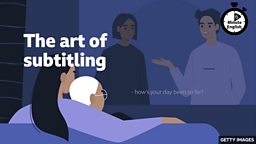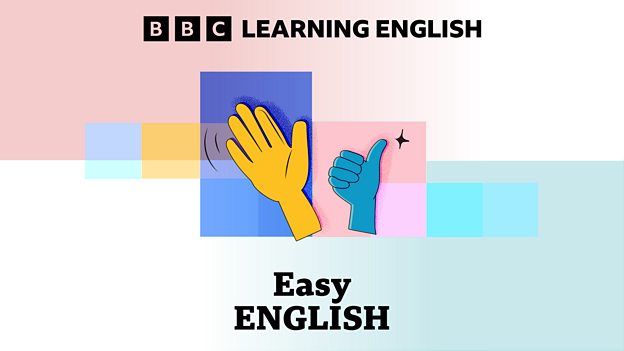6 Minute English
Intermediate level
Foraging for wild food
Episode 230720 / 04 Jul 2023

Introduction
Do you pick the fruit you eat from trees? In this programme, we’ll be hearing about a new foraging project taking place across the UK, and, as usual, we'll be learning some useful new vocabulary as well.
This week's question
2019 was a good year for the group, Wild Food UK, with the launch of their foraging pocket guide, a handbook aimed at helping foragers find and identify safe wild food to eat. So, according to the group’s website, what is the most popular food foraged in the UK?
a) seaweed
b) berries
c) mushrooms
Listen to the programme to find out the answer.
Vocabulary
foraging
searching the countryside for edible wild plants, fruit, and fungi to eat
microbiome
tiny organisms including bacteria and fungi which live in the human digestive system, break down food for energy and strengthen immune defences
buy into (an idea)
completely believe in an idea
nettles
nutritious edible plant with leaves covered in hairs that sting when touched
superfood
food containing many vitamins and nutrients considered very good for human health
flat
Without energy, emotion or excitement
TRANSCRIPT
Note: This is not a word-for-word transcript.
Beth
Hello. This is 6 Minute English from BBC Learning English. I’m Beth.
Neil
And I’m Neil.
Beth
Nowadays we are so used to getting food whenever we want that we’ve almost forgotten how we managed in the past. But for thousands of years before supermarkets, humans found food through foraging – moving from place to place looking for wild food to eat.
Neil
Since the Covid pandemic, foraging for wild food has become popular again. Why go to the shops when you can walk into nearby countryside and parks to collect edible plants, mushrooms, and fruit for free?
Beth
Of course, you can’t eat everything you find growing outside - some poisonous plants can make you very ill. But there’s something exciting about setting off on a culinary treasure hunt to find new edible plants for dinner.
Neil
In this programme, we’ll be hearing about a new foraging project taking place across the UK, and, as usual, we'll be learning some useful new vocabulary as well.
Beth
But first I have a question for you, Neil. 2019 was a good year for the group, Wild Food UK, with the launch of their foraging pocket guide, a handbook aimed at helping foragers find and identify safe wild food to eat. So, according to the group’s website, what is the most popular food foraged in the UK? Is it:
a) seaweed?
b) berries? or,
c) mushrooms?
Neil
There’s so much coastline in Britain, I reckon it must be a) seaweed.
Beth
OK. I'll reveal the answer later in the programme. Monica Wilde, known as Mo, is the author of The Wilderness Cure, a book charting her year of eating only wild food. Mo is one of a group of 26 experienced foragers taking part in the ‘Wild Biome Project’, a three-month experiment into the health benefits of introducing wild food into your diet.
Neil
Microbiome are tiny organisms including bacteria and fungi which live in the human digestive system, help break down food, and strengthen immune defence. The idea is that natural unprocessed foods found in the wild support our microbiome, leading to a range of health benefits from weight loss to increased energy levels. The foragers’ microbiome is measured and monitored before, during and after the experiment. Here’s Mo Wilde chatting with one of the foragers, Rob Gould, for BBC Radio 4’s, The Food Programme.
Rob Gould
Even if you don't buy into the whole idea of fully encompassing a wild diet - because for most people it's fairly much unattainable - but for people just incorporating a small amount of wild food into their diet, you’re increasing massively the amount of nutrients, the micronutrients and the vitamins that you're getting, a lot of which aren't even available regularly in your commonly bought foods.
Mo Wilde
Sometimes people say, ‘Oh well, you know, if everybody foraged, they wouldn't be enough’, but I've never noticed a shortage of nettles, and if nettles didn't grow in this country, we'd probably be flying them in as a superfood because there's so nutritious, and above all they’re free.
Beth
With the high levels of nutrients and vitamins found in wild plants like nettles, Rob has bought into the idea of foraging. If you buy into an idea, you completely believe in it.
Neil
Did you say stinging nettles - the wild plants growing everywhere which have leaves covered in hairs that sting when you touch them?
Beth
Yes, it turns out that nettles are packed full of nutrients and vitamins which are great for human health. In fact, they’re even considered a superfood - food that contains many vitamins and other nutrients known to be very good for human health.
Neil
The Wild Biome Project hasn’t finished yet, but it already seems that the foragers are feeling happier as well as healthier. They all report greater appreciation for the smell and taste of their food, and say foraging has given them increased self-worth, a natural treatment for depression and anxiety. Here’s one forager describing her feelings to BBC Radio 4’s, The Food Programme.
Forager
I found the first week I felt really quite flat, quite limited carbs coming in from chestnut flour primarily. Feeling loads better now… feeling loads better in the last few days, and I'm really enjoying the project… having a great time, in fact. I don't really want it to stop.
Beth
At the start of the experiment this forager felt flat – low in energy, emotion or excitement, but after some weeks of wild food, fresh air and appreciation of nature, she doesn’t want the project to stop.
Neil
Well, I’m convinced! So, what’s first on my wild food shopping list? I think it’s time you revealed the answer to your question, Beth.
Beth
Right, I asked what was the most popular foraged food in the UK, and you guessed it was seaweed, which was the wrong answer. Mushrooms are the most popular foraged food. OK, let's recap the vocabulary we've learned from this programme about foraging - looking for wild edible plants to eat.
Neil
Microbiome are tiny bacteria and organisms in the human gut which help digest food and strengthen immunity.
Beth
If you buy into an idea, you completely believe in it.
Neil
Nettles are common nutritious edible plants with leaves covered in hairs that sting when touched.
Beth
A superfood describes a food containing many vitamins and other healthy nutrients.
Neil
And finally, the adjective flat means lacking energy, emotion or excitement – and probably means you should go outside and get foraging! Once again, our 6 minutes are up. Goodbye for now!
Beth
Bye!
Latest 6 Minute English

Sexism: Female farmers fighting back
Episode 231228 / 28 Dec 2023
How can female farmers beat rural sexism?



Invasive species: Why don't we eat them?
Episode 231207 / 07 Dec 2023
Could we eat invasive species?

What and where is Little Italy?
Episode 231130 / 30 Nov 2023
Mozzarella, ricotta, cannolis and focaccia... Where are we? Little Italy of course!

Social media and teenage health
Episode 231123 / 23 Nov 2023
What are the health risks of social media for teenagers?








Sounds that make you want to scream
Episode 230928 / 28 Sep 2023
Are there any sounds you find upsetting?




The stories behind our names
Episode 230831 / 31 Aug 2023
What do our names reveal about our culture and family history?


Are you unhappy at work?
Episode 230817 / 17 Aug 2023
Does work leave you feeling bored and exhausted?







Is it wrong to eat plants?
Episode 230629 / 29 Jun 2023
Should we treat plants with the same consideration we treat animals with?



The art of subtitling
Episode 230608 / 08 Jun 2023
Hear how subtitles can help bring TV and movies to life

Ecotourism: good or bad?
Episode 230601 / 01 Jun 2023
We discuss the growing popularity of ecotourism.

Can climate change cause more disease?
Episode 230525 / 25 May 2023
With warming temperatures, mosquitos are now spreading to new areas, including Europe.



Ice and the origins of life on Earth
Episode 230504 / 04 May 2023
We talk about an essential element for life to thrive.

Women in politics
Episode 230427 / 12 Apr 2023
We discuss some of the reasons why women make up only 26% of the world's politicians.

What's the point of museums?
Episode 230420 / 20 Apr 2023
We discuss the role of museums in the 21st century and the items taken from different countries.

How culture affects sadness
Episode 230413 / 11 Apr 2023
What ways do you think culture can influence sadness?

Would you eat a Kalette?
Episode 230406 / 06 Apr 2023
Hear about a new kind of vegetable making an entrance in British kitchens

Do you get jealous easily?
Episode 230330 / 06 Mar 2023
Let's talk about the ugly green-eyed monster


Food and mood
Episode 230316 / 16 Mar 2023
We look at the link between what you eat and how you feel.

How to talk to a climate denier
Episode 230309 / 09 Mar 2023
The dos and don'ts of trying to discuss science with someone who doesn't believe in it

Losing your mother tongue
Episode 230302 / 02 Mar 2023
Hear the story of a woman who replaced her native Czech for English.

The health benefits of apples
Episode 230223 / 23 Feb 2023
Could 'an apple a day keep the doctor away'?


Doomscrolling: Why do we do it?
Episode 230209 / 27 Jan 2023
What is doomscrolling and why are we attracted to bad news? Listen to find out!

Exercise for the lazy
Episode 230202 / 22 Jan 2023
What's the least amount of exercise you should do to stay healthy?

Can AI have a mind of its own?
Episode 230126 / 26 Jan 2023
Hear about the software engineer who became 'friends' with his computer

Climate change: Are there too many people?
Episode 230119 / 13 Jan 2023
Does the size of your carbon footprint depend on where in the world you were born? Listen to find out!

The hidden life of buffets
Episode 230112 / 12 Jan 2023
Neil and Sam discuss buffet meals and the history behind them.

Songwriting
Episode 230105 / 05 Jan 2023
Writing a memorable song isn't easy. So is there an art to good songwriting?







